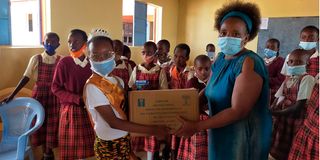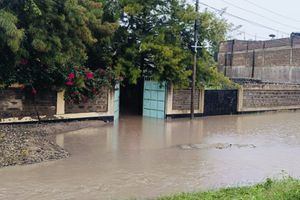How education law can end ‘period poverty’ for our girls

Fabbie Naisabah (left) from Tasia Catholic Primary distributes free sanitary towels to girls in Samburu County.
In pursuit of menstrual equity, Kenya was the first country to eliminate tampon tax, in 2004. It also abolished import duty on sanitary towels in 2011. It’s also one of the very few countries to legislate the provision of free sanitary towels to girls in public schools. This significantly reduced costs for menstruating girls, especially from low-income families.
With a packet of sanitary pads costing Sh60 on average and vulnerable families struggling to put one meal on the table every day, access to sanitary products is difficult for most of these girls. Despite the government’s actions, an estimated million girls miss school every month due to ‘period poverty'.
Menstrual Health Kenya says 2.65 per cent of girls and women can’t afford menstrual products. With menstrual stigma and shaming, girls from vulnerable backgrounds often rely on men for period products such as sanitary towels. Hence, two out of three girls in rural areas engage in transactional sex, perpetuating a patriarchal cycle of exploitation.
Fortunately, the Basic Education Amendment Act, 2013 gazetted in June 2017 reads, in Section 39(14), “...provide free, sufficient, and quality sanitary towels to all girls registered and enrolled in a public basic education who have reached puberty and provide a safe and environmentally sound mechanism for disposal of the sanitary towels”.
Studies show girls from poor families miss 20 per cent of school days for lack of sanitary towels. Over time, period poverty contributes to undesired education outcomes among girls and disparity in enrolment and transition rates among girls and boys.
A million girls require Sh60 million every month (Sh720 million annually) to buy sanitary towels. This is the cost of their dignity, respect and better education outcomes. But Parliament further reduced an already low budgetary allocation in Financial Year 2022/2023 for sanitary towels from Sh470 million to Sh260 million—in spite of the Act.
The budget cutback has far-reaching consequences to girls in low-income families, where the socioeconomic interruption of Covid-19 has eroded meagre disposable incomes among households. Girls were, and still are, rendered vulnerable. Between January and May 2020, some150,000 girls became pregnant and did not resume learning.
Paradigm shift
Charity and government funding are not sustainable, hence an uncertain future. We need a paradigm shift from our dependence on handouts.
Inadvertently, period poverty exposes vulnerable girls to sexual and reproductive health risks, such as infections arising from using unhygienic materials like socks, leaves, old pieces of mattress, dirty rugs and dung. Perhaps, to enforce Basic Education Amendment Act, 2013 with the stringent shoestring budget, duty bearers should consider cost-effective reusable cloth sanitary towels, partnering with TVETs, NGOs, CBOs, women’s groups, cottage industries and other industry players for the manufacture of these reusables. With CBC, all students can be taught to make reusable sanitary towels.
All our girls ask is, implement and enforce the law.
Ms Shairoz, a public health specialist, is a member of the Lake Region Economic Bloc Committee of Eminent Persons for Covid-19 Control, Advisory, Resource Mobilization and Socio-economic Recovery. [email protected].





